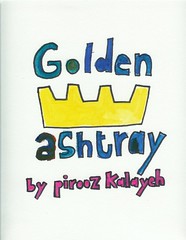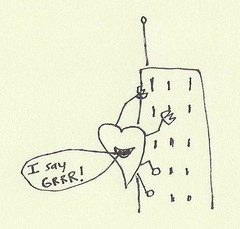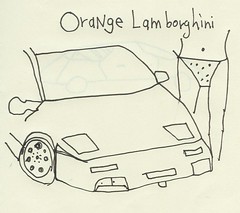
Marjane Satrapi and Mohsen Makmalbof speak out about Iran's elections, providing proof that Mousavi won by 65% of the vote.
Azar Nafisi also speaks about the current political climate.
Is Azar right? Will this be the beginning of change in Iran? Will the regime crumble?
Iran's story is so complicated. On Sunday, I watched a panel of Ivy League professors argue the possibilities on American television. None had a clear perspective because opinions from individuals outside Iran are going to be half-cocked by the very virtue that they can't know because they aren't there (note: the Johns Hopkins scholar on PBS the other day who was convinced his statistics done in Baltimore reflected the entire country's voting preference), are simply clueless or politically motivated (see article for a journalist who says Iran's totalitarian regime is rather flexible ideologically), or simply have a colored perspective from the five different government overhauls the country has seen in the last hundred years.
I mean, that fact alone is astounding when you think of it--five different shifts in government in a hundred years! Let's look at the trail: 1) The Qajar Dynasty--kings and queens that replaced previous kings and queens of the Zand Dynasty--who were then replaced by an ambitious general, 2) Reza Khan, who made himself dictator/king (1925); and who was then overthrown and replaced by his son, 3) Reza Pahlavi (1941), who was put into power with the assistance of Britain and the U.S.S.R after they found his father's relations with Germany during WWII a bit too kind; and then 4) Mohammad Mossadeq's short-lived stint as prime minister (1951-1953) before he tried to nationalize oil and was quickly replaced in a coup sponsored by the United States; and then the rise of the 5) Ayotallah Khomeni after the Iranian Revolution (1979), which has lead the country to its current state of mullah-ruled-plutocracy and unrest because the Iran-Iraq War wiped out the generations that might have supported an Ahmadinejad in the past.
It sounds more like a soap opera than a historical account. It is also a pattern that will not end until Iranians understand that they are being manipulated with religious and political triggers for the sake of money and power. Once Iran's people can see that each shift has occurred because of the politics of oil--and they can forgive the U.S., Britain, and U.S.S.R. for meddling in their affairs for a piece of that pie--they might have a chance in putting a democratic government into place.
With 65% of the country under 30, it's no wonder Iran's citizens want their MTV, Estee Lauder cosmetics, and any other freedom they see on American Idol. Previous party leaders who were against a progressive democratic government are now changing their tunes with the recognition of this new voting force. As Nafisi says in Iranian Writer... by Kathleen McCaul, "...Mousavi [has] taken up the progressive slogans, which he had previously fought against" in the past campaign. Of course, this might dismay those who would hope for Mousavi to head a possible new government. Some might even say that he is a bandwagon turncoat. Others, like my friend, Khosrow, don't believe things are as they seem at all. As he explained to me by e-mail yesterday: "It takes a specific kind of fox to outwit a governmental organization who kills first and asks questions later. Who knows? You might even have to go deep undercover to uncover the dark clouds that hang over Tehran today."












No comments:
Post a Comment